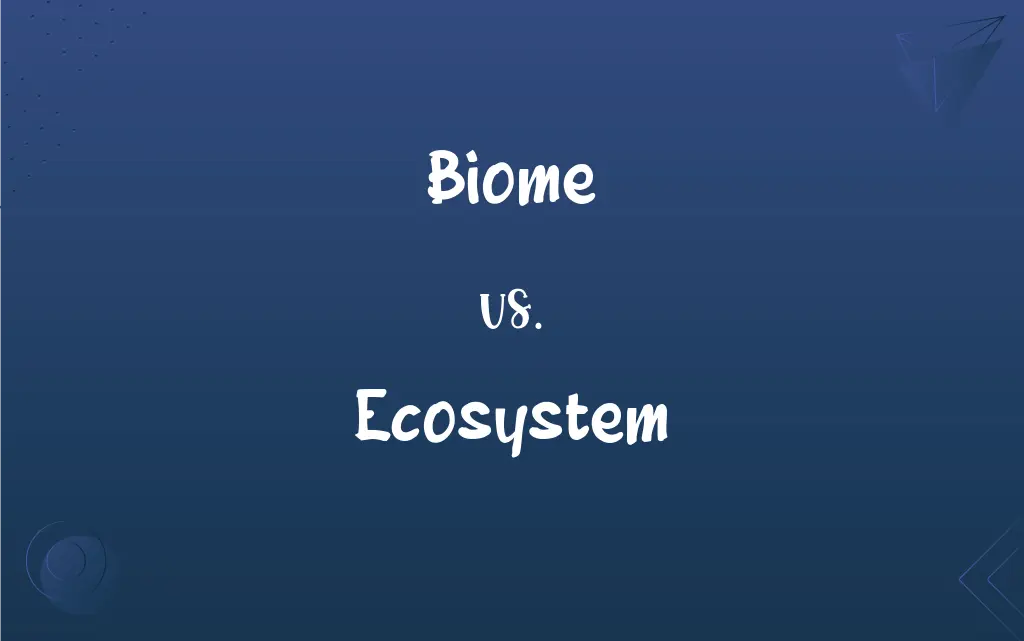Biome vs. Ecosystem: What's the Difference?
Edited by Aimie Carlson || By Harlon Moss || Updated on October 28, 2023
A biome is a large community of plants and animals sharing similar climate conditions, while an ecosystem is a specific community of living organisms interacting with their environment.

Key Differences
A biome refers to a vast region on Earth defined by its unique climate, soil, plants, and animals. Ecosystems, conversely, focus on the interactions between living organisms and their physical environment within a specific area.
The scope and scale between a biome and an ecosystem vary greatly. While biomes can span across continents, encompassing numerous ecosystems, an ecosystem can be as large as a forest or as small as a pond.
Biomes are generally classified by factors such as temperature and precipitation, leading to categories like deserts, rainforests, or tundras. In contrast, ecosystems are defined by their biotic (living) and abiotic (non-living) components, such as a coral reef ecosystem or a grassland ecosystem.
It's crucial to understand that while every biome contains multiple ecosystems, not every ecosystem spans an entire biome.
Comparison Chart
Scale
Larger, can span continents
Smaller, can be as vast as a forest or as tiny as a puddle
ADVERTISEMENT
Definition By
Climate, soil, general plant, and animal types
Interactions between living organisms and their environment
Components
Broad categories of flora and fauna
Specific community of plants, animals, and their physical surroundings
Examples
Desert, rainforest, tundra
Coral reef, grassland, pond
Variability within type
Lesser, as it's a broad category
Greater, as it's more specific and diverse within a biome
Biome and Ecosystem Definitions
Biome
Biomes are vast areas with similar climate conditions.
Tundras, being a type of biome, are characterized by their cold climates.
ADVERTISEMENT
Ecosystem
Ecosystems maintain a balance through the food web and nutrient cycles.
The disruption of predators in an ecosystem can lead to an overpopulation of certain prey.
Biome
Biomes are usually determined by temperature and precipitation.
The characteristics of the boreal forest biome are shaped by its cold temperatures and moderate rainfall.
Ecosystem
All components of an ecosystem are interdependent.
In a marine ecosystem, the well-being of one species often affects many others.
Biome
A biome encompasses various ecosystems within its boundaries.
Within the rainforest biome, you'll find a myriad of diverse ecosystems.
Ecosystem
Ecosystems are found everywhere, from vast regions to minute spaces.
A single decaying log can host its unique ecosystem.
Biome
A biome is a major community of flora and fauna in a specific climate.
The Sahara Desert is an example of a hot desert biome.
Ecosystem
An ecosystem consists of living organisms interacting with their environment.
The pond ecosystem thrives with fish, plants, and microorganisms working in harmony.
Biome
Earth has several major biomes, each with unique life and climate.
From dense forests to open grasslands, each biome presents its distinct environment.
Ecosystem
An ecosystem's health reflects the balance of its biotic and abiotic factors.
A polluted river ecosystem can cause a decline in fish and plant life.
Biome
A major regional or global biotic community, such as grassland or desert, characterized chiefly by its prevailing climate and vegetation.
Ecosystem
An ecological community together with its environment, functioning as a unit.
FAQs
Are cities considered ecosystems?
Yes, cities can be viewed as urban ecosystems with humans, plants, animals, and their environment.
What defines a biome?
A biome is a large area with similar climate, soil, plants, and animals.
Which biome covers the largest land area?
Forests, including tropical, temperate, and boreal, cover the most extensive land areas.
What encompasses an ecosystem?
An ecosystem includes living organisms and their interactions with the physical environment.
How many major biomes are there?
There are several major biomes, including deserts, grasslands, forests, tundras, and aquatic zones.
Is climate change affecting biomes?
Yes, climate change can shift biome borders and affect their characteristics.
Can ecosystems overlap?
Yes, for example, where a forest meets a wetland, the ecosystems can intermingle.
What's a human-made ecosystem example?
Agricultural fields, where crops, pests, and beneficial organisms interact, are human-made ecosystems.
Do biomes have boundaries?
While biomes have general borders, they can be gradual with overlapping characteristics.
How do human activities impact ecosystems?
Human actions like pollution, deforestation, and urbanization can significantly alter ecosystem balance and health.
Can multiple ecosystems exist within a biome?
Yes, a biome can contain numerous diverse ecosystems.
Can a single garden be an ecosystem?
Yes, even a garden can be an ecosystem with plants, insects, and microorganisms interacting.
What factors shape a biome?
Climate, including temperature and precipitation, largely determines the characteristics of a biome.
What happens if an ecosystem is disturbed?
Disturbances can disrupt the balance, possibly leading to reduced biodiversity and altered function.
How do ecosystems maintain balance?
Balance is maintained through interactions, food webs, and natural cycles like the water cycle.
Which is larger, a biome or an ecosystem?
A biome is larger, often spanning continents, while ecosystems are more localized.
How do biomes influence biodiversity?
Each biome offers unique habitats, promoting diverse species adapted to those conditions.
Why is ecosystem conservation important?
Conserving ecosystems maintains biodiversity, natural resources, and overall planetary health.
What's the smallest ecosystem?
Ecosystems can be tiny, like a patch of moss on a rock or a puddle.
Are biomes static?
No, biomes can change over time due to various factors like climate change or human intervention.
About Author
Written by
Harlon MossHarlon is a seasoned quality moderator and accomplished content writer for Difference Wiki. An alumnus of the prestigious University of California, he earned his degree in Computer Science. Leveraging his academic background, Harlon brings a meticulous and informed perspective to his work, ensuring content accuracy and excellence.
Edited by
Aimie CarlsonAimie Carlson, holding a master's degree in English literature, is a fervent English language enthusiast. She lends her writing talents to Difference Wiki, a prominent website that specializes in comparisons, offering readers insightful analyses that both captivate and inform.































































